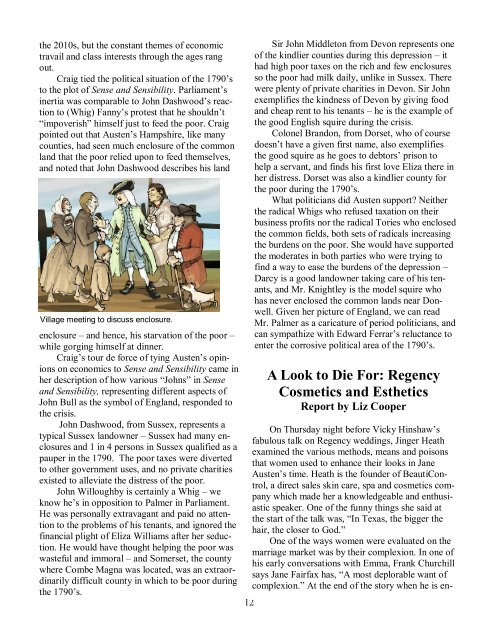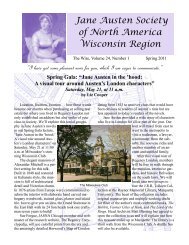Volume 24, no 3, Winter 2011 - Jane Austen Society of North ...
Volume 24, no 3, Winter 2011 - Jane Austen Society of North ...
Volume 24, no 3, Winter 2011 - Jane Austen Society of North ...
Create successful ePaper yourself
Turn your PDF publications into a flip-book with our unique Google optimized e-Paper software.
the 2010s, but the constant themes <strong>of</strong> eco<strong>no</strong>mic<br />
travail and class interests through the ages rang<br />
out.<br />
Craig tied the political situation <strong>of</strong> the 1790’s<br />
to the plot <strong>of</strong> Sense and Sensibility. Parliament’s<br />
inertia was comparable to John Dashwood’s reaction<br />
to (Whig) Fanny’s protest that he shouldn’t<br />
“impoverish” himself just to feed the poor. Craig<br />
pointed out that <strong>Austen</strong>’s Hampshire, like many<br />
counties, had seen much enclosure <strong>of</strong> the common<br />
land that the poor relied upon to feed themselves,<br />
and <strong>no</strong>ted that John Dashwood describes his land<br />
Village meeting to discuss enclosure.<br />
enclosure – and hence, his starvation <strong>of</strong> the poor –<br />
while gorging himself at dinner.<br />
Craig’s tour de force <strong>of</strong> tying <strong>Austen</strong>’s opinions<br />
on eco<strong>no</strong>mics to Sense and Sensibility came in<br />
her description <strong>of</strong> how various “Johns” in Sense<br />
and Sensibility, representing different aspects <strong>of</strong><br />
John Bull as the symbol <strong>of</strong> England, responded to<br />
the crisis.<br />
John Dashwood, from Sussex, represents a<br />
typical Sussex landowner – Sussex had many enclosures<br />
and 1 in 4 persons in Sussex qualified as a<br />
pauper in the 1790. The poor taxes were diverted<br />
to other government uses, and <strong>no</strong> private charities<br />
existed to alleviate the distress <strong>of</strong> the poor.<br />
John Willoughby is certainly a Whig – we<br />
k<strong>no</strong>w he’s in opposition to Palmer in Parliament.<br />
He was personally extravagant and paid <strong>no</strong> attention<br />
to the problems <strong>of</strong> his tenants, and ig<strong>no</strong>red the<br />
financial plight <strong>of</strong> Eliza Williams after her seduction.<br />
He would have thought helping the poor was<br />
wasteful and immoral – and Somerset, the county<br />
where Combe Magna was located, was an extraordinarily<br />
difficult county in which to be poor during<br />
the 1790’s.<br />
12<br />
Sir John Middleton from Devon represents one<br />
<strong>of</strong> the kindlier counties during this depression – it<br />
had high poor taxes on the rich and few enclosures<br />
so the poor had milk daily, unlike in Sussex. There<br />
were plenty <strong>of</strong> private charities in Devon. Sir John<br />
exemplifies the kindness <strong>of</strong> Devon by giving food<br />
and cheap rent to his tenants – he is the example <strong>of</strong><br />
the good English squire during the crisis.<br />
Colonel Brandon, from Dorset, who <strong>of</strong> course<br />
doesn’t have a given first name, also exemplifies<br />
the good squire as he goes to debtors’ prison to<br />
help a servant, and finds his first love Eliza there in<br />
her distress. Dorset was also a kindlier county for<br />
the poor during the 1790’s.<br />
What politicians did <strong>Austen</strong> support? Neither<br />
the radical Whigs who refused taxation on their<br />
business pr<strong>of</strong>its <strong>no</strong>r the radical Tories who enclosed<br />
the common fields, both sets <strong>of</strong> radicals increasing<br />
the burdens on the poor. She would have supported<br />
the moderates in both parties who were trying to<br />
find a way to ease the burdens <strong>of</strong> the depression –<br />
Darcy is a good landowner taking care <strong>of</strong> his tenants,<br />
and Mr. Knightley is the model squire who<br />
has never enclosed the common lands near Donwell.<br />
Given her picture <strong>of</strong> England, we can read<br />
Mr. Palmer as a caricature <strong>of</strong> period politicians, and<br />
can sympathize with Edward Ferrar’s reluctance to<br />
enter the corrosive political area <strong>of</strong> the 1790’s.<br />
A Look to Die For: Regency<br />
Cosmetics and Esthetics<br />
Report by Liz Cooper<br />
On Thursday night before Vicky Hinshaw’s<br />
fabulous talk on Regency weddings, Jinger Heath<br />
examined the various methods, means and poisons<br />
that women used to enhance their looks in <strong>Jane</strong><br />
<strong>Austen</strong>’s time. Heath is the founder <strong>of</strong> BeautiControl,<br />
a direct sales skin care, spa and cosmetics company<br />
which made her a k<strong>no</strong>wledgeable and enthusiastic<br />
speaker. One <strong>of</strong> the funny things she said at<br />
the start <strong>of</strong> the talk was, “In Texas, the bigger the<br />
hair, the closer to God.”<br />
One <strong>of</strong> the ways women were evaluated on the<br />
marriage market was by their complexion. In one <strong>of</strong><br />
his early conversations with Emma, Frank Churchill<br />
says <strong>Jane</strong> Fairfax has, “A most deplorable want <strong>of</strong><br />
complexion.” At the end <strong>of</strong> the story when he is en-




